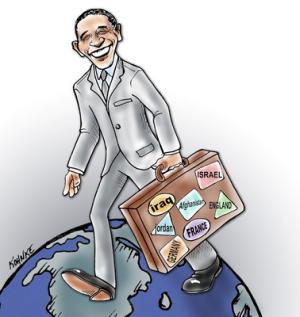- MENU
- HOME
- SEARCH
- WORLD
- MAIN
- AFRICA
- ASIA
- BALKANS
- EUROPE
- LATIN AMERICA
- MIDDLE EAST
- United Kingdom
- United States
- Argentina
- Australia
- Austria
- Benelux
- Brazil
- Canada
- China
- France
- Germany
- Greece
- Hungary
- India
- Indonesia
- Ireland
- Israel
- Italy
- Japan
- Korea
- Mexico
- New Zealand
- Pakistan
- Philippines
- Poland
- Russia
- South Africa
- Spain
- Taiwan
- Turkey
- USA
- BUSINESS
- WEALTH
- STOCKS
- TECH
- HEALTH
- LIFESTYLE
- ENTERTAINMENT
- SPORTS
- RSS
- iHaveNet.com
By Martin van Creveld

The U.S. president who did most for Israel was not Harry Truman, who recognized the Jewish state almost immediately after it had been founded. Nor was it John Kennedy, Lyndon Johnson or Richard Nixon. Or Gerald Ford, or Ronald Reagan, or the two George Bushes, or Bill Clinton.
All of these provided America's ally with economic assistance, supplied it with arms and stood at its side at critical moments, from the 1967 Six-Day War to the 2006 war against Hezbollah in Lebanon.
The president who did most for Israel was Jimmy Carter -- the same Carter who has sometimes been described as an Israel-hater.
In numerous appearances around the world, he has never shrunk from criticizing Israel for its faults, real and imaginary; the dislike is mutual.
Back in 1977-78, the Israeli-Egyptian peace talks, which had been started a year earlier by Prime Minister Menahem Begin and President Anwar Sadat, got stuck. At issue were such questions as how much land Israel was to return, the fate of the settlements in the Sinai, etc.
Meeting now here, now there, in what increasingly looked like a traveling circus, the leaders and their advisers vainly circled each other in an attempt to reach an agreement both sides could accept.
Enter Moshe Dayan, the crafty one-eyed former general and minister of defense who was serving as Begin's foreign minister. When holding the first meetings with Egyptian representatives in the summer of 1977, he had acted in great secrecy, even putting on a disguise and using an alias. Now that shipwreck was staring him in the face, he called on Begin to bring in the Americans.
Though he could never say so, the reason why Dayan wanted the Americans was to put pressure on Begin. The prime minister had come to power promising to preserve Israeli rule over the occupied territories.
Changing his mind could very well cause the members of his own party, Likud, to leave the coalition; the outcome, Dayan knew, would be the fall of the government and the end of any hope for peace.
In the end, Dayan prevailed. With President Carter personally committed to the peace process, Begin found himself in a position in which he had to turn to his followers and ask them, quite literally: "Do you really want to quarrel with the United States?" The majority saw his point, and when the time to make a decision came they voted in the right direction.
Another reason why Begin was able to carry the vote through the Knesset was because he could rely on Labor, which was then in the opposition, to support him. Thus the decision to ratify the agreement was a truly bipartisan one, supported by a strong majority and representing all that was best, most rational and most peace-loving in Israeli society.
The situation is very similar to what it was in 1978.
Now as then, Israel is ruled by a rightwing coalition.
Now as then, some of its elements, specifically the party led by Foreign Minister Avigdor Lieberman, are more hawkish than the prime minister and his Likud Party is.
Now as then, talks with the other side -- this time it's the Palestinians -- are ongoing but leading nowhere.
Now as then, while some members of Israel's ruling coalition are strongly opposed to any concessions to the Palestinians, the Knesset also contains a strong opposition party. Its name is Kadima, its platform is peace with the Palestinians, and, like Labor in its time, it will provide the necessary votes if called upon to do so.
The most important difference is in personalities.
Begin was an honest demagogue who passionately believed in Israel's right to retain the territories; Netanyahu is a petty rascal who believes in very little except, perhaps, his own advancement.
Unlike Begin, a man of exceptional integrity, he can be bought.
Whatever they may say in public, for many years now both sides in the Middle East have been secretly waiting for a second Carter.
His task is to bang their heads together and force them to do what they themselves are unable to do: namely, give up their more extreme claims and reach some kind of agreement.
The outcome may not be, almost certainly will not be, quite to the liking of either of the parties.
Surely, though, it will extinguish many sparks that could set up another conflagration; with some luck, it may even yield a lasting peace for the Middle East and, for the U.S., one headache less.
WORLD | AFRICA | ASIA | EUROPE | LATIN AMERICA | MIDDLE EAST | UNITED STATES | ECONOMICS | EDUCATION | ENVIRONMENT | FOREIGN POLICY | POLITICS
Israel | Waiting For Netanyahu | Martin van Creveld
International Current Events, News & World Affairs